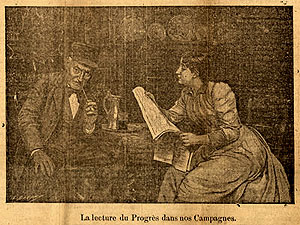 |
|
|
|
|

| Brothers Gaspard and Aurèle Pacaud,
from the town of Saint-Norbert in the Arthabaska region of Quebec,
published Le Progrès in Windsor from 1881 to approximately 1919.
In this section, you will learn who the
Pacaud brothers were, why they came to
Windsor and how, in spite of fierce competition, they managed to
maintain Le Progrès as the only significant French newspaper in
Windsor for nearly 40 years. We will examine how the newspaper itself functioned - that is to say, the practical aspects of running a newspaper at the end of the 19th century, focusing on issues like writing and editing, printing, publicity and subscription drives. We will examine as well editorial policy at Le Progrès, highlighting the newspaper’s stand on language, religion and politics. |
|
| While it could be considered a Liberal Party organ, ruthless in its dealings with its political enemies, Le Progrès was at times quite flexible when it came to advancing the interests of the Pacaud brothers. Not so in dealings with rival newspapers : in this section, we will have a look at Le Progrès’s main competitors : Le Courrier d’Essex (which would briefly be known as Le Courrier de l’Ouest before its ultimate demise) and Le Courrier (no link to the previous Courriers, but equally short-lived). Le newspaper war between Le Progrès and the first Courrier in particular produced spectacular clashes that make today's campaigns seem pale by comparison. | |
In fact, the journalism of the times was very different from what we know
today. Personal attacks, rumours and gossip often passed as news, not to
mention “articles” that were no more than advertisements in disguise. In
other areas, the newspaper’s role seemed to be to astonish readers rather
than inform them :very little attempt was made to distinguish scientific
facts from what we would now call “pseudo-science.” But Le Progrès remained
above all a window on the world for local French-Canadians and the paper
made good use of existing news services to bring
national and international
stories to its readers. As well, it tried hard to entertain subscribers with
serialized novels, popular poetry, and an unending supply of jokes, puzzles
and short comic sketches, several of which you can see in the
entertainment
section.



